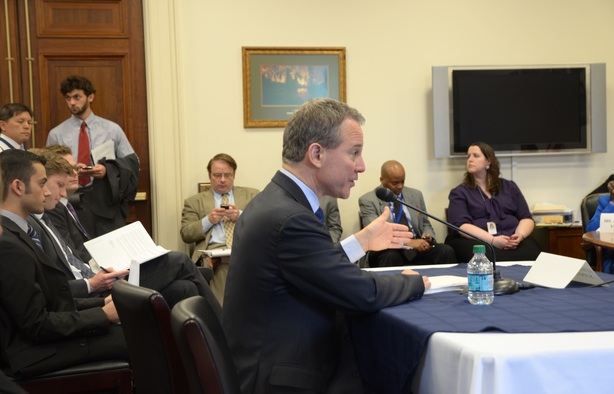
Facing a tough audience of Congressional progressives Thursday, New York Attorney General Eric Schneiderman attempted to address concerns about the staffing and intentions of the Residential Mortgage-Backed Securities working group—the federal inquiry into Wall Street malfeasance leading up to the financial crisis.
Before the public hearing, Representative Maxine Waters handed Schneiderman a letter signed by forty members of Congress expressing concern that his investigation had “stalled.” It also asked him to hire Representative Brad Miller as an executive director. (I reported earlier this week that Miller was told he would not get the job and that Miller believes the task force is afraid of Republican and industry blowback to his hiring).
High-profile signees included Waters and Representatives Jim McDermott, Earl Blumenauer, Lynne Woolsey, Keith Ellison, John Lewis, Jerrold Nadler and Jim McGovern. The letter read, in part:
We understand that the task force is leveraging pre-existing enforcement efforts and staff at participating agencies, but we remain concerned that the Working Group has not independently established a robust infrastructure commensurate with the charge of investigating this component of the 2008 financial crisis.
With three months having passed since the initial announcement of the creation of the RMBS Working group, we fear this group’s efforts may be stalled. The best way to reignite this important undertaking is to hire a qualified, aggressive and committed staff director, and give them the power and budget to hire the necessary support staff. Without quick action in this regard, public confidence in the Working Group may be at risk.
During the public hearing, Schneiderman acknowledged that the working group was not yet adequately staffed, but expressed hope that it would be. “We don’t have the resources yet. The operation just got set up really in the last sixty days or so,” he said. “They’ve posted for jobs, they’re hiring people, they’re detailing people, they’re entering into contracts with contractors for auditing and financial analysis.”
He clarified that the previously reported fifty staffers are new to the investigation, and are being dispatched from the Department of Justice to offices across the country. “I’m not counting folks like the fifteen people in my office who were already working on this,” he said.
Popular
"swipe left below to view more authors"Swipe →
Representative Waters asked Schneiderman if the staffing might double to 100, and Schneiderman said he expected even more than that. “We have massive institutions with hundreds of lawyers and millions of documents that you can bury key facts in. I want this done right,” he said. (Progressive groups are calling for 1,000 staffers however, which is likely what’s needed to combat the “hundreds of lawyers” on the other side, as Schneiderman accurately described).
Schneiderman said staffing announcements would come in a week or two, and urged the members to pressure President Obama directly with a message that “we need to staff up as quickly and as fully as possible to give the people of the United States the full investigation into the misconduct that caused the crash of the economy that they are demanding and that they deserved.”
Representative Jan Schakowsky of Illinois asked Schneiderman point-blank if the working group would pursue criminal charges. “What people want to know—there are people in jail for stealing a loaf of bread,” she said. “In your view, are there going to be people [on Wall Street] who will actually go to jail for perpetrating these acts?”
Schneiderman said he couldn’t prejudge an investigation, but “any notion that there won’t be criminal prosecutions is simply wrong.”
He also added an interesting tidbit, that the working group is pursuing extensions of the statutes of limitations, known as “tolling.” (This is used in some cases where the negative effects of a crime are ongoing and may not be immediately apparent, like in medical malpractice cases).
“One of the most important steps we’ve been taking in collaboration with our federal colleagues is to try and get agreements to toll the statute of limitations on as many of these institutions as we can, so that we do have the time to do this, and we’ve been pretty successful thus far,” he said. I contacted his office for more details on these agreements and have not yet received a response.
While Schneiderman has so far been unable to please members of the Progressive Caucus with the substance of his investigation, he at least talked a good game during the hearing with fiery rhetoric about deregulation and the need for strong investigations.
In his opening statement, Schneiderman thanked the members for “refusing to give up to the narrative of the conservative policies that, to me, were proven to be unsound by the bubble and the crash of the housing markets, and yet still have their advocates in these halls.”
Adding to the pushback against these narratives, Schneiderman said: “I cannot go into detail about anything in a law enforcement investigation, but I assure you we’ve encountered no evidence that teachers or cops or firefighters contributed to the blowing up of the American economy in 2007. That was a different set of professionals.”
“This didn’t just happen. This wasn’t caused by sunspots or global warming or a tidal wave,” Schneiderman continued. “This is a man-made catastrophe caused by reckless deregulation and just plain greed.”


